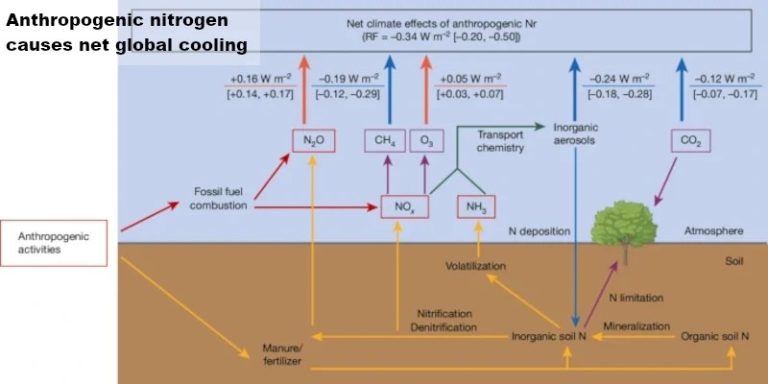Article by Eric Worrell
“…The current findings therefore provide no reason to mask harmful effects, let alone to consider additional nitrogen inputs as a means to combat global warming. …”
July 24, 2024
Researchers find net effect of man-made nitrogen reducing global warmingAuthor: Eberhard Fritz, Max Planck Society
Nitrogen fertilizers and nitrogen oxides derived from fossil fuels are known for their environmental damage: they pollute air and drinking water, cause over-fertilization of water and land ecosystems, reduce biodiversity and damage the ozone layer.
However, in terms of climate, they have a net cooling effect. This is the conclusion reached after a comprehensive analysis by an international team led by scientists from the Max Planck Institute of Biogeochemistry in Jena. In it, scientists assessed the various climate impacts of nitrogen compounds from agricultural and non-agricultural sources.
…
Without man-made nitrogen inputs, the climate would be even warmer
An international team led by Sönke Zaehle and Cheng Kong from the Max Planck Institute for Biogeochemistry has now summarized the various warming and cooling effects in a study published in the journal nature. They found that reactive nitrogen entering the Earth system through human activities cooled the climate by -0.34 watts per square meter – known in climate research as net negative radiative forcing.
…
“This sounds like good news, but you have to remember that nitrogen emissions have many harmful effects, such as on health, biodiversity and the ozone layer,” Zahler said. “Therefore, the current findings provide no reason to mask its deleterious effects, let alone to consider additional nitrogen inputs as a means to combat global warming.”
…
Learn more: https://phys.org/news/2024-07-net-effects-nitrogen-attenuate-global.html
Research summary;
open access
Release date: July 24, 2024
Net impact of anthropogenic reactive nitrogen on global climate
Cheng Gong, Hanqin Tian, Hong Liao, Naiqing Pan, Shufen Pan, Akihiko Ito, Atul K. Jain, Sian Kou-Giesbrecht, Fortunat Joos, Qing Sun, Hao Shi, Nicolas Vuichard, Qing Zhu, Changhui Peng, Feder HM Tang & Sönke Zaehle
nature (2024) cited this article
Abstract
Since pre-industrial times, human activities have greatly increased the load of reactive nitrogen (Nr) in the Earth system1,2leading to widespread eutrophication and air pollution3,4,5,6. Increases in Nr can also affect global climate through various effects on atmospheric and terrestrial processes, but the cumulative net climate impact has not yet been elucidated. Here we show that anthropogenic Nr results in a net negative direct radiative forcing of -0.34[−0.20, −0.50]Width meters−2 Relative to 1850, the net cooling effect in 2019 is the result of increased aerosol loading, shortened methane lifetime, and increased terrestrial carbon sequestration associated with increased anthropogenic Nr, which are not offset by the enhanced warming effect of atmospheric nitrous oxide and ozone. Future projections using three representative scenarios suggest that this cooling effect is likely to diminish, primarily due to reduced aerosol loading and longer lifetimes of methane and, in particular, nitrogen2In all cases, oxygen-induced warming is likely to continue to increase. Our results suggest that future reductions in anthropogenic nitrogen oxides to achieve environmental protection goals will need to be accompanied by enhanced reductions in anthropogenic greenhouse gas emissions to mitigate climate change in line with the Paris Agreement.
Learn more: https://www.nature.com/articles/s41586-024-07714-4
This follows recent bad-good news that carbon dioxide is greening deserts.
If we get more bad news like this, people may start to ask whether this is actually good news, and whether claims that we are experiencing a global climate crisis have been greatly exaggerated.
related
